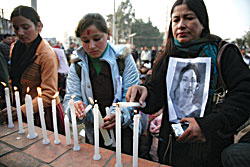 MIN RATNA BAJRACHARYA |
JANAKPUR-It was impossible to believe that Uma Singh at Ganga Sagar Ghat on Tuesday morning, an FNJ flag draped over her still body, face bandaged, cuts on the head visible, was the same Uma I had met two months ago.
Uma's looks were deceptive, her tiny frame contained abundant energy. By the time I strolled into Radio Today's studio at 6AM in mid-November, Uma had wrapped up her morning bulletin. She was running around the office and passing instructions in a matter-of-fact, professional way.
She briefed me on the format of Janakpur's most popular Maithili political discussion show, Garma garam chai. Uma said to both her co-anchor and me: "Please avoid English words. The program is meant for people in the villages." I nodded, a little ashamed my Maithili was not as fluent.
We discussed the day's news: Girija Koirala's Birganj rally, Peace Minister Prabhakar's impending visit for unofficial talks with armed groups and the security situation. Her questions showed a sharp political understanding. The sympathy for the Madhes cause was obvious but she was firm in her denunciation of the criminality and violence raging in the name of Madhesi rights.
It is a rare sight in the Tarai: a working woman journalist. And I stayed on to chat a bit more. She told me how opportunities for women were limited in the district, how field reporting was dangerous and how she wanted to move to Kathmandu. I took her number before leaving, thinking I would interview her for a profile at some point.That will not happen now.
At the cremation site, others who knew her more intimately could not hold back. FNJ president Dharmendra Jha, who is from Dhanusha, broke down. Siraha editor Rajesh Verma, who initiated Uma into journalism at Siraha campus and made her sub-editor of his Dhristhikon weekly, blamed himself for her fate. Sahadev Karki, who put her up at his home in Janakpur, was too stunned to react.
We do not know who killed Uma, but we know her murder was different. Most groups in the Tarai, including Maoists, prefer to use local pistols, available across the border for Rs 1,100. Why did 15 men have to attack Uma at her house, stab her, mutilate her body and leave her unrecognisable? Was the manner of the murder a message in itself?
We know Uma's father and brother were disappeared and killed by the Maoists when her family resisted Maoist attempts to grab their property. She wanted to pursue the case, but the culture of impunity has meant that those killers remain scot-free.
"If they had been arrested, this would never have happened. No one is scared here," her close friend and Siraha colleague, Rajesh Verma told us. We know Uma wrote critically of the Maoists. She had told some friends: "Journalism is a way for me to take revenge and seek justice for my family's suffering."
We also know that there was a major squabble in Uma's family. Uma's father was a landowner in Siraha's Maheshpur village, besides having property in Mirchaiya bazaar. The Maoists had captured it in the past, but some other family members were eyeing it now. These relatives had a cold relationship with both Uma and her mother.
All this was happening in a region where there is no law and order, journalists face constant threats, the culture of silence is deepening and a death is a mere page 3 brief in a newspaper. A deep anger runs across sections here. Many in the Tarai feel that the state has willingly abdicated its responsibility to protect lives because Madhesis, not Pahadis, are dying.
The government could change that perception by acting. District activists say they are never offered the same protection as those in Kathmandu. The capital's civil society can remedy it by continuing to push this issue like they did this week. More than one journalist could be overheard saying. "If we cannot take this case to an end and win justice, there is no point in working here anymore."
As she was breathing her last on the way to Bardibas, Uma's only question was, "Why? What crime did I commit?" If she had stayed on as a meek, submissive woman in her village and accepted existing power and patriarchal norms, Uma may have survived. Her crime was that she spoke up. She fought for her rights: as a citizen, as a journalist. And she carved an independent path. She paid the ultimate price fighting for values we cherish.
READ ALSO
A minister out of control
The moral wasteland
Flame of truth



